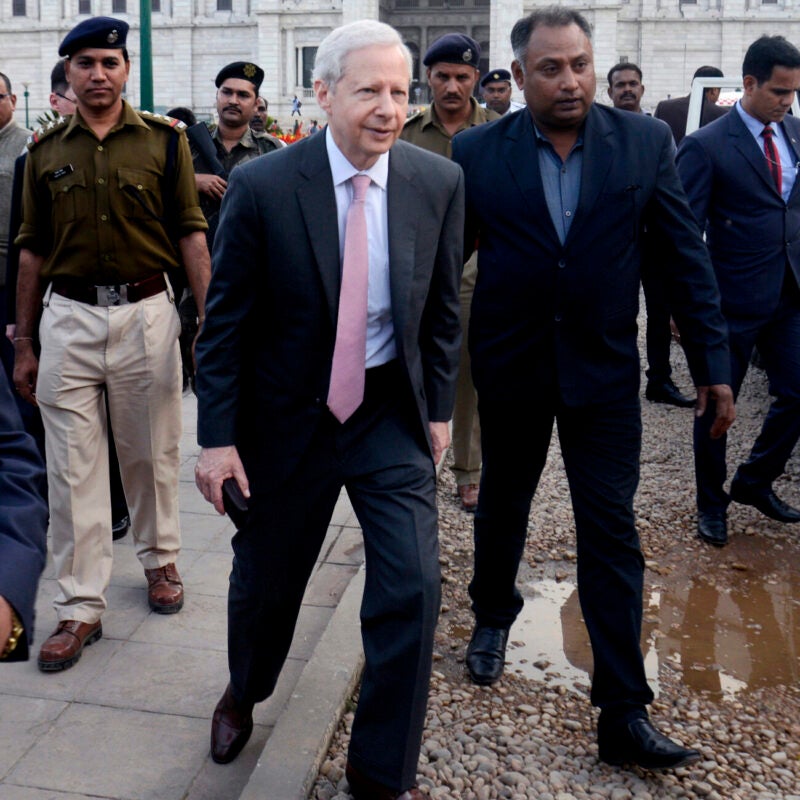When Kenneth Juster ’79 was in high school, he traveled to Thailand on a school exchange program. He saw a map of the world there and noticed that Thailand was at the center of it. It was the first time he had ever seen a world map without the United States as its focal point.
“You realize that people look at the world through their own lens, and it’s a different lens than I have,” he said.
His exposure to a different perspective and culture stirred his interest in pursuing a career centered on international affairs, culminating in what he called “the greatest privilege of my life” when he served as U.S. ambassador to India from 2017 to 2021.
Prior to that, Juster was immersed in issues involving India during a career that has spanned law, business, and government, including being a major architect of the Next Steps in Strategic Partnership initiative with India when he was undersecretary of commerce in the George W. Bush administration and helping to open Salesforce’s India office when he was an executive VP for the company. While his experience served him well, he acknowledged that he still faced a learning curve as ambassador. In addition to representing U.S. interests on issues including trade, security, and human rights, he managed the third-largest U.S. mission in the world, with 2,500 employees and their families. The job became even more challenging when COVID-19 hit, locking down the embassy in New Delhi. He also helped coordinate President Donald Trump’s visit to India and was one of the few ambassadors granted a private meeting with the country’s prime minister, Narendra Modi, in which Juster advocated for better investment opportunities and lower barriers to trade. Another highlight: his multiple visits with the Dalai Lama.
“I’m someone who believes that you always try things a little outside your comfort zone so that you can expand your comfort zone.”
“I feel fortunate that I came to this position at a point in my life where I had been involved in a variety of private-sector activities in law, finance, and technology, as well as had previous government experience,” said Juster. “So I was able to bring all of that together.”
Perhaps his most formative government experience occurred when he served as deputy and senior adviser to Deputy Secretary of State Lawrence S. Eagleburger during the George H.W. Bush administration, which he called “the gold standard” in foreign policy. During that time, he helped negotiate for the release of a key Chinese dissident in the aftermath of the Tiananmen Square protests, worked on U.S. assistance programs after the collapse of the Berlin Wall, and helped persuade the Israeli government not to take preemptive action against Iraq before the Persian Gulf War. “I didn’t realize at the time how special was the group of people with whom I worked, and the period of history and the issues on which we worked,” he said.
Now a senior counselor at Freshfields in New York City, Juster credits his legal training for providing a strong foundation for everything he’s done in his career. Of course, that started at Harvard Law School, where he particularly benefited from international law courses taught by Hal Scott, Louis Sohn LL.M. ’40 S.J.D. ’58, and Henry Steiner ’55, he said. Before and after his service in the George H.W. Bush administration, he practiced law with Arnold & Porter, including in international arbitration and litigation. In 2005, he moved to Salesforce in San Francisco shortly after it went public. Joining the burgeoning high-tech company was a change in both geography — he had never lived on the West Coast before — and culture. He later returned to New York as a partner at the global investment firm Warburg Pincus.
“I’m someone who believes that you always try things a little outside your comfort zone so that you can expand your comfort zone, as opposed to try only things that you know you can do,” Juster said.
When younger people ask him for career advice, he tells them to embrace any opportunities that may arise. Juster did that himself from an early age growing up in Scarsdale, New York. He worked on his junior high school newspaper with a friend whose grandfather was Ed Sullivan. And they took the opportunity to interview for the paper performers who appeared on “The Ed Sullivan Show,” including Mick Jagger and Keith Richards of the Rolling Stones, Tom Jones, Ethel Merman, and Wayne Newton. It helped teach him not to be intimidated by any person or challenge he might face. That’s a lesson he hasn’t forgotten.
